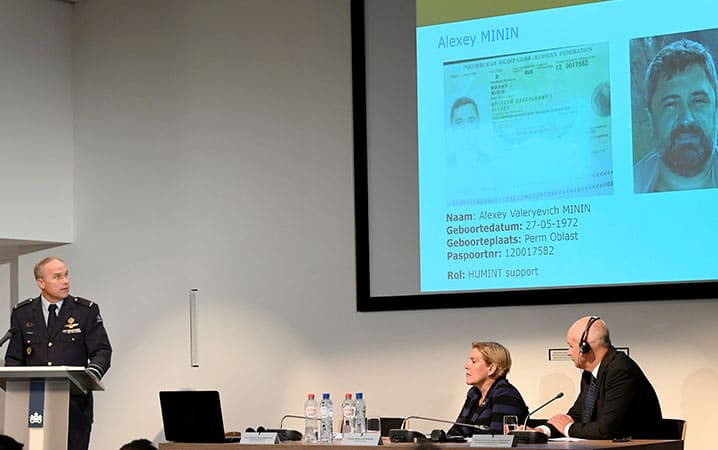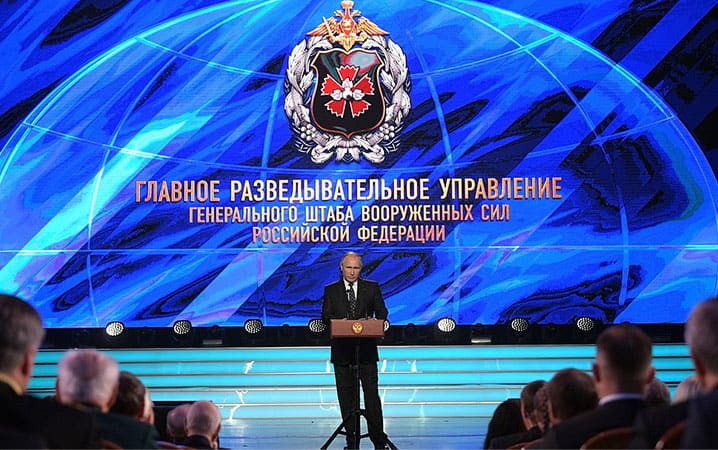Russia’s intelligence services – well-funded, aggressive and politically protected – remain at the heart of Moscow’s wider political war against the West, intended to disrupt, distract, and demoralise. Although many different instruments are used, from disinformation and corruption to diplomacy to economic pressure, the intelligence services are committed to not just gathering information but active operations, and thus they play a crucial role in their use. The lesson for NATO is not just of the need for continued vigilance but also that the solidarity embodied by the Alliance is as important in dealing with non-military as military threats.
A year of living dangerously
There was no let-up in Russia’s aggressive intelligence campaign against the West in 2018. In March, an attempt was made to kill Sergei Skripal – a former officer of Russia’s military foreign intelligence service (GRU) turned British agent – with a rare nerve agent, Novichok. Skripal, his daughter and a first responder survived but a passer-by, who later discovered the vial in which the poison was carried, died.
Greece threw out two Russian diplomats and banned two others in July 2018, citing attempts to interfere with the historic vote in (what is now formally known as) the Republic of North Macedonia over changing the country’s name.

As one of several coordinated denunciations of Russian activities, Britain and the Netherlands accuse Russian agents of trying to hack into the Organization for the Prohibition of Chemical Weapons (OPCW), while it was investigating the attack on Sergei Skripal, a former Russian spy, in the United Kingdom.
Pictured (left to right) General Onno Eichelsheim, the director of Netherlands Defence Intelligence and Security Service, Dutch Minister of Defence Ank Bijleveld and British Ambassador to the Netherlands Peter Wilson at a news conference in The Hague – 4 October 2018. © Reuters
A Russian spy was made persona non grata in Sweden in August and, in September, the Norwegian Police Security Service arrested an alleged agent, although he was later released.
In October, four GRU officers were detained by the Dutch authorities as they were hacking into the systems of the Organisation for the Prohibition of Chemical Weapons (OPCW) in The Hague – the watchdog that had been investigating the Skripal poisoning case.
Nor does 2019 promise to be any better. Already, a major in the Belgian military intelligence service (ADIV) has been accused of being a Russian agent and a Swedish national was arrested for contacts with an officer of Russia’s foreign intelligence service (SVR).
Countries across Europe are mobilising to identify and prevent potential interference with the European elections in May as well as a slew of local ones to be held this year. In Denmark, for example, the government has announced an action plan to prevent Russian meddling in its parliamentary elections, to be held in or by June.
Tactical learning, strategic obduracy
However many operations are foiled, exposed in precise detail, and followed up with expulsions and recriminations, the Kremlin seems committed to its campaign. Rather than being humbled, it has instead made some tactical shifts of emphasis.Thus, although there is undoubted and justified concern about Russian activities around the forthcoming European elections, Moscow appears to have learned that it is unlikely to be able to swing the results of polls through direct interference, and that such efforts can be counter-productive. Instead, the emphasis is rather on exploiting the campaigns and outcomes to maximise internal dissent and to make them as acrimonious as possible. A steady flow of polarising disinformation and propaganda, playing to every extreme, is likely to be supported by covert intelligence activity. The latter could range from hacking and leaking real or doctored materials, to providing relatively small amounts of what the Russians call chernaya kassa, or ‘black account’ moneys, to useful individuals, campaigns and media outlets (in an age when a passionate partisan with a website or a twitter feed can be considered such an ‘outlet’).
I was in Moscow during the initial British expulsions that followed the Skripal case – before other countries also showed their solidarity – and a think tanker close to the Kremlin expressed what seemed to be the government’s consensus when he assured me that this would be the sum total of the diplomatic cost. The unexpectedly strong international response came as a shock to Moscow and seems to be deterring that kind of overt, even wilful challenges. Inevitably, largely temporary lulls in activity ensued as networks were re-established. However, other than that, it seems to have done nothing to discourage Moscow from its aggressive and high-tempo intelligence campaign, merely slightly (and possibly temporarily) moderating its tactics.

Russian President Vladimir Putin addresses intelligence officers at a gala event to mark the centenary of The Main Directorate of the General Staff of the Armed Forces of Russia (GRU) – 2 November 2018. © en.kremlin.ru
It is telling, after all, the extent to which President Vladimir Putin continues to put his faith in his security and intelligence services. He continues to lean on them as his primary sources on analysis of the outside world (much to the chagrin of the Ministry of Foreign Affairs). And he used the gala celebrating the GRU’s centenary in November 2018 to signal his wholehearted support of the agency and its officers’ “professionalism, personal daring and decisiveness”, confounding those who thought he might be angered by their recent high-profile failures.
Desperately seeking solidarity
If the Kremlin is unlikely in the near future to change its ways, the crucial question becomes how best to respond. The multinational response to the Skripal attack – in which 27 NATO countries expelled 123 Russian diplomats and spies – remains the single most visible rebuke to the Russian intelligence challenge and also the most powerful example of a potential systemic counter.NATO has proven to be a uniquely effective alliance precisely because of the solidarity it embodies: an attack on one member state is an attack on all. At NATO’s Warsaw Summit in 2016, it was decided that also a so-called ‘hybrid attack’ could potentially lead to the invocation of Article 5 (the collective defence clause in NATO’s founding treaty). That is a mutual commitment that even Moscow appears to take seriously, for all Western concerns about potential faint-heartedness and division.
However, NATO’s effectiveness also rests on its relatively tight focus and limited mission. While it has moved into the realm of out-of-area expeditionary operations, and while it is well aware of the dangers that non-military challenges pose to warfighting capabilities, it is not well placed to deal with many of them, and nor should it. The weaknesses the Russian campaign exploits, from the feelings of communities that feel politically marginalised, to the continued problems of corruption and illicit financial flows, are issues of governance, not defence.
Other agencies, such as the European Union and/or alliances of individual states, need to demonstrate the same solidarity that NATO embodies. Either way, until the Kremlin can believe that if it carries out malign non-military operations against a Western state, it risks more than simply a bilateral challenge, it has little reason substantively to scale down its operations.
Individual states also have to up their game, especially in the realms of intelligence and counter-intelligence spending. Although NATO’s famous benchmark – that member states ought to spend two per cent of GDP on defence – is for many still an aspiration rather than a reality, it does at least provide a sense of the minimum target. There is no such common figure for spending on defence against political operations, with the result that the proportional budgets vary wildly, from relatively high spenders such as Estonia, the United Kingdom and the United States, to nations at the other end of the spectrum.
After all, in the context of alliances, where sharing intelligence and discussing common plans are a daily necessity, member states which fail to invest in their counter-intelligence agencies put not only their own security at risk but also that of their allies. Russia’s intelligence challenge is not going to abate in the near future and there will be other challenges on the horizon, possibly from ascendant powers such as China or non-state actors. Whether a task for NATO, or the European Union, or some other constellation of states, or a combination, it is time for the debate about adequate levels of security spending to move beyond the purely military and into the covert domains.
